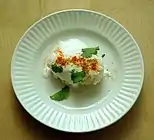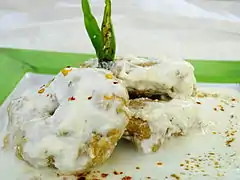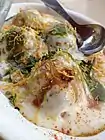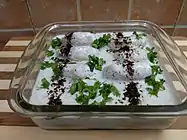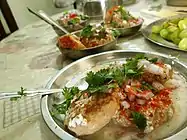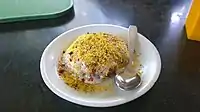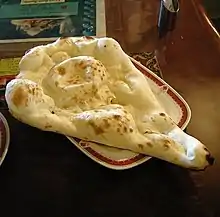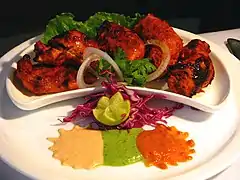Dahi vada
Dahi vada is a type of chaat (snack) originating from the Indian subcontinent.[1] It is prepared by soaking vadas (fried lentil balls) in thick dahi (yogurt).[2]
.JPG.webp) Dahi vada | |
| Type | Chaat |
|---|---|
| Place of origin | Indian subcontinent |
| Associated cuisine | Indian |
| Main ingredients | Vada, dahi (yogurt) |
| Variations | Rajasthani Dahi Bada, Bengali Doi Bora, Delhi Dahi Bhalla, Odia dahi bara, Dahi Baray, Dahi Bhallay, Dahi Pallay |
Names
Dahi vada is also known as "dahi vade" (दही वडे) in Marathi, dahi barey/dahi balley (دہی بھلے/دہی بڑے) in Urdu, dahi vada (दही वड़ा) in Hindi, dahi bhalla (ਦਹੀ ਭੱਲਾ) in Punjabi, thayir vadai in Tamil,[3] thairu vada in Malayalam, perugu vada in Telugu, mosaru vade in Kannada, dahi bara (ଦହି ବରା) in Odia and doi bora (দই বড়া) in Bengali.
History
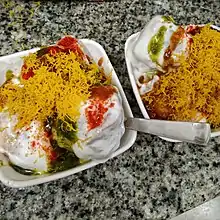
A recipe for dahi wada (as kshiravata) is mentioned in Manasollasa, a 12th-century Sanskrit encyclopedia compiled by Someshvara III, who ruled from present-day Karnataka.[4][5] Descriptions of dahi vada also appear in literature from 500 BCE.[6] Today, dahi vada is prepared on festival such as Holi.[5][7]
Preparation
Washed urad lentils are soaked overnight and ground into a batter for the vada, then cooked in hot oil.[8] The hot deep-fried vadas are first put in water and then transferred to thick beaten yogurt. The vadas are soaked for a period of time before serving.[8] Additions to the batter may include golden raisins. Vadas may be topped with coriander or mint leaves, chilli powder, crushed black pepper, chaat masala, cumin, shredded coconut, green chilies, boondi, thinly sliced fresh ginger, or pomegranate. Sweeter curd is preferred in some places in India, especially in Maharashtra and Gujarat, although the garnishing remains the same. A combination of coriander and tamarind chutney is often used as a garnish.[8] The batter can be made using chickpea flour too.[9][10]
Locations
Dahi vada as popular street chaat is found in various cities across India, including Chennai, Bangaluru, Delhi, Mumbai, Jaipur, Kolkata, Cuttack, and Indore. Dahi vadas are also found in Pakistan, especially in regions of Punjab and in major cities.[11][12][13][14]
See also
References
- "Soft, crisp vadas!". The Hindu. 20 February 2014.
- Madhulika, Nisha (11 March 2015). "Express Recipes: How to make the perfect Dahi Vada". The Indian Express. Retrieved 3 May 2019.
- "சோள தயிர் வடை /கார்ன் தஹி வடா". Dinakaran (in Tamil). Archived from the original on 28 September 2022.
- K.T. Achaya (2003). The Story of Our Food. Universities Press. p. 85. ISBN 978-81-7371-293-7.
- Vishal, Anoothi. "Chaat Masala: Gourmet Indian street food". The Economic Times. Retrieved 4 September 2020.
- Krishna, Priya (17 August 2020). "Chaat Is More Than the Sum of Its Many Flavors". The New York Times. ISSN 0362-4331. Retrieved 4 September 2020.
- "Mutton Khichda to Dahi Vadas: Home-made, but street style". The New Indian Express. Retrieved 4 September 2020.
- "Street Food: Make Authentic Dahi Vada At Home With Veranda Restaurant's Exclusive Recipe". NDTV Food. Retrieved 4 September 2020.
- "Dahi Vada Recipe: How to Make Dahi Vada". recipes.timesofindia.com. Retrieved 27 April 2020.
- "The story of Dahi Bhalla and how to make it at home". The Times of India. 9 March 2020. Retrieved 27 April 2020.
- "Make delicious dahi vada at home (recipe inside)". The Indian Express. 21 August 2020. Retrieved 4 September 2020.
- "Street Food Of India: Craving Vada? Here Are 5 Quick And Easy Vada Recipes To Try At Home". NDTV Food. Retrieved 4 September 2020.
- "Popular Foods of Ayodhya: 7 Traditional dishes Ayodhya is famous for". The Times of India. 5 August 2020. Retrieved 4 September 2020.
- "Coronavirus Lockdown Nutrition: Dahi Vada, cooling and tangy treat". The Free Press Journal. Retrieved 4 September 2020.
